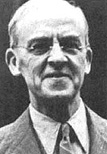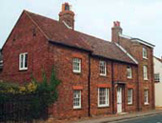
POLITICAL WARFARE EXECUTIVE
The first meeting of the three ministers and the three officials, as the Executive Committee, took place at the Foreign Office on Wednesday 17th. September, 1941 and thereon the Executive Committee, whilst running the department, would receive guidance and approval from the Ministerial Committee, at regular meetings. The appointment of the Ministerial Committee and the establishment of P.W.E., did much to bring an end to the infighting amongst the ministers and senior officials but there were no winners. Dalton had given up SOI, the propaganda arm of S.O.E., Bracken transferred part of the Foreign Publicity Division of the Ministry of Information and for the B.B.C., their relevant European sections had gone to the new organisation. Yet the problems of administration continued to be a trouble, mainly since the Woburn personnel were fighting a protracted battle against central control. Indeed Lockhart, on his first visit as chairman of the Executive Committee, met with threats of revolt and resignations and not surprisingly regarded himself as no more than a link, between the Ministers and his lieutenants.
A reshuffle
By early 1942 P.W.E., was still in a bad shape. The Woburn organisation, backed by Dalton, nurtured their reluctance to relocate whilst Bracken tried to establish both a geographical and ministerial control. He even considered resigning, to thereby let Stafford Cripps take over P.W.E. and ensure a single ministerial control but in the event, P.W.E. was soon to be given a new charter by the Prime Minister, reducing the number of ministers from three to two. In a reshuffle of the Government, Cripps accordingly became leader of the House of Commons whilst, on 21st.February, 1942, a neat extraction of Dalton from the propaganda scene altogether came about, by his appointment as the President of the Board of Trade!
Dalton is transferred
The news reached him during a visit to his constituency, attending an engagement during Warship Week at Shildon and asked to telephone Whitehall 4464, in driving snow he did so from an air raid shelter, close to the U.D.C. offices. Speaking thereby direct to Churchill, on receiving Churchill's confirmation of his ability for the job he duly accepted the position.
Dalton's legacy
Dalton's contribution to the sabotage organisation had been considerable for, from a position with no agents in Western Europe, by the time he left there were scores in place. Thus taking Wilmot and Gaitskell with him, Dalton departed for duties new and the vacancy now left as Minister of Economic Warfare and therefore head of S.O.E., became filled by R.C. Palmer, Lord Wolmer, who on the death of his father became 3rd Earl of Selbourne, in February,1942. A high Anglican, he had once been Assistant Postmaster General, until making a speech in which he referred to the postmen as slackers! A personal friend of Churchill, he nevertheless lacked the enthusiasm for either special operations or propaganda and in fact opted out of ministerial control.
The new structure
Under P.W.E.'s new two minister arrangement, Eden became responsible for policy and Bracken for administration. As for Lockhart, now the Director General, answering to the Foreign Secretary on foreign policy and the Minister of Information on operational matters he hardly enthused about the role; 'So now I am sole boss of the whole show;' he wrote, 'I feel no exhilaration.' Thereon his main priority was to assemble in London the skilled propagandists from Woburn and so provide a singular accommodation for the department. With the lessened threat of bombing, this had been first recommended in November, 1941, further proposing that staff engaged in secret broadcasting and the production of white leaflets, typesetting and design would remain at Woburn. Those concerned with other aspects and with the B.B.C. would then be moved to London, the P.W.E. headquarters finding accommodation on the three upper floors of Bush House. The building already accommodated the European Service of the B.B.C. and most of the P.I.D. staff, excepting those in secret intelligence and black broadcasting, who had previously worked at Woburn.


When Hugh Dalton became head of S.O.E. he appointed his secretary, Hugh Gaitskell to supervise the Woburn operations.

The three upper floors provided accommodation for the head quarters of P.W.E.